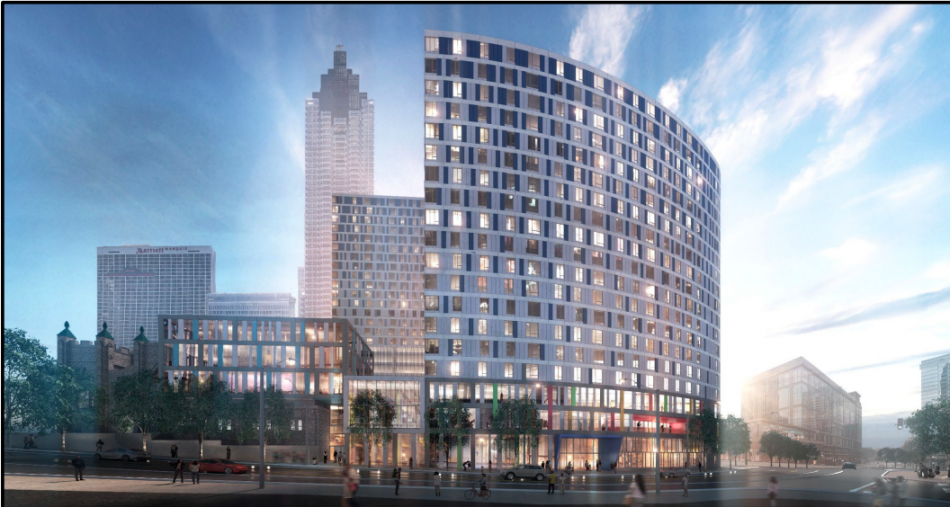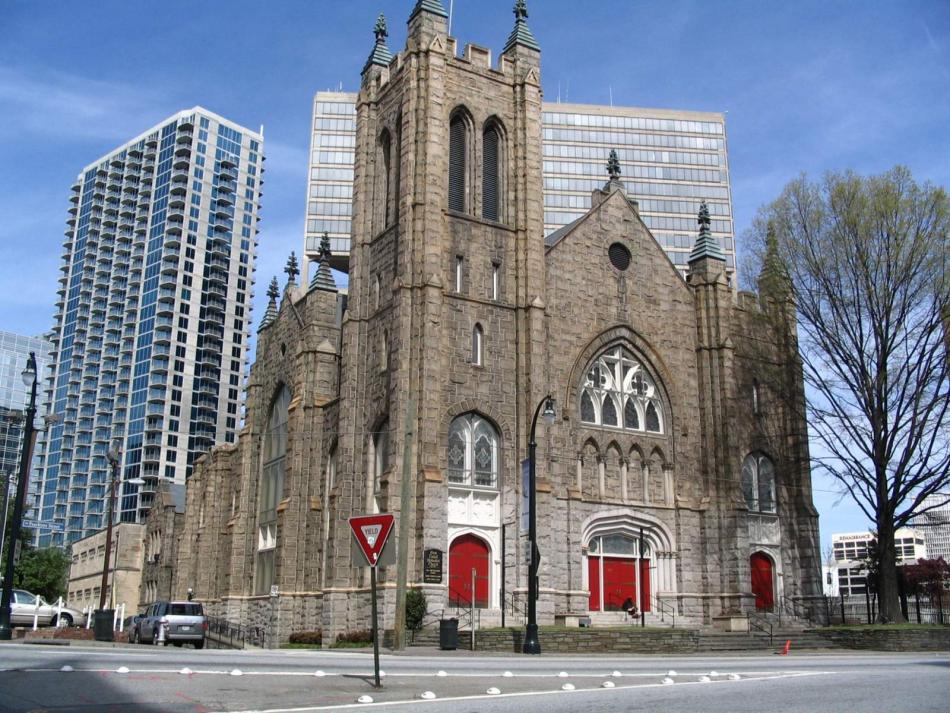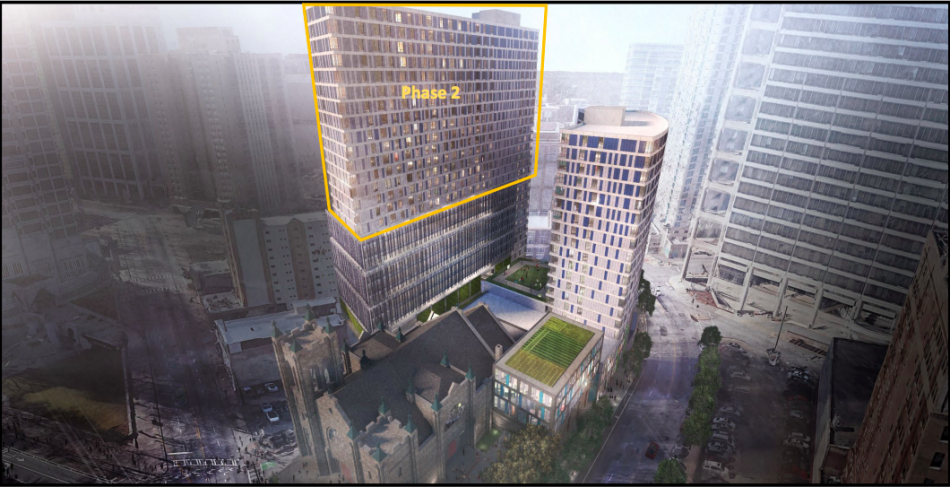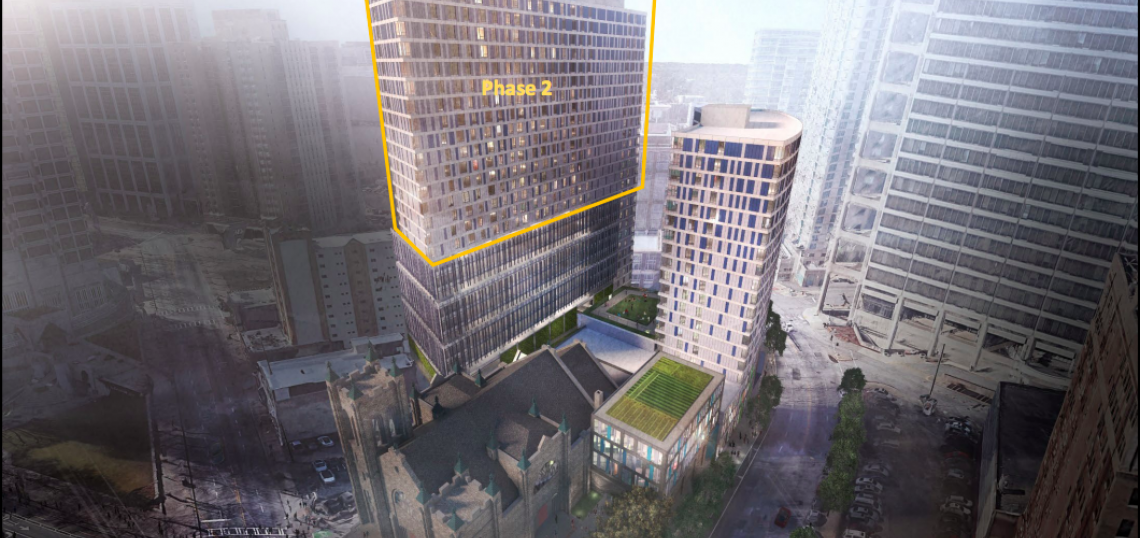A historic Atlanta church’s “God-size” ambitions to create hundreds of affordable housing options will be set in motion Sunday, according to City of Atlanta officials.
Atlanta Mayor Andre Dickens is scheduled to host a groundbreaking Sunday morning for what’s described as “new faith-based affordable housing development” around Atlanta First United Methodist Church’s 360 Peachtree Street property.
The ceremony will also mark the congregation’s 175th anniversary in Atlanta, according to a city-issued announcement today.
Church leaders first made headlines in 2019 by issuing a Request for Proposals that challenged developers to help them realize a “God-size vision” for creating inclusive housing on 1.8 acres next the gothic-style sanctuary from 1903. Situated between Peachtree and West Peachtree streets, the land in question is currently home to pay parking lots, an unused outbuilding, and an education building, Atlanta UMC leadership has previously said.
Inquiries to church officials about the project’s status this week haven’t been returned.
 How the curved, phase-one building would rise along Ivan Allen Jr. Boulevard. Evergreen Redevelopment/Moody Nolan; via Invest Atlanta
How the curved, phase-one building would rise along Ivan Allen Jr. Boulevard. Evergreen Redevelopment/Moody Nolan; via Invest Atlanta
Earlier this year, paperwork obtained by Urbanize Atlanta indicated the project would be built in phases—and that monthly rents for new apartments would start around $500.
Atlanta UMC’s development task force unanimously approved a joint venture in 2021 with Chicago-based nonprofit developer Evergreen Real Estate Group, citing that company’s track record of mission-driven, community-focused projects in urban environments.
At last check in February, the church and developer were seeking a predevelopment loan of $250,000 from Eastside TAD funding to set the project in motion, according to Invest Atlanta.
The first phase is expected to cost north of $105 million overall.
That would include a 16-story building with 170 apartments—the majority of them reserved as affordable or workforce housing—where West Peachtree Street meets Ivan Allen Jr. Boulevard.
A four-story podium building with 5,000 square feet of retail, a parking garage, and new facilities for Atlanta First Day School and Ansley School would also be included in the phase one mix, per Invest Atlanta documents from early 2022.
Aside from some renovations, the historic sanctuary building would be untouched. The church’s annex, meanwhile, is expected to be rehabbed; it houses the Midtown Assistance Center to help the working poor with food, transportation, rent, and utilities.
 The current church was erected in 1903 with Stone Mountain granite. According to church historians, its belfry contains the only church bell in Atlanta to survive the Civil War. It's been used in three different buildings since 1850.ZeWrestler/Wikimedia Commons; 2009 image
The current church was erected in 1903 with Stone Mountain granite. According to church historians, its belfry contains the only church bell in Atlanta to survive the Civil War. It's been used in three different buildings since 1850.ZeWrestler/Wikimedia Commons; 2009 image
The phase one timeline called for delivering the first round of apartments in 2024.
Renderings also showed a phase-two tower of significant height standing immediately south of the church and phase-one building. The site’s SP1 zoning classification would allow for a tower rising 50 stories or more, as church leaders have previously noted. It’s unclear how many apartments the two-phase project might ultimately entail, or when it all could be built.
According to the project’s phase-one affordable housing forecast, 42 units in the 16-story building would rent for 30 percent of the area’s median income or less.
That means rents would range from $485 for one-bedroom apartments (four of them total), to $582 for two-bedrooms (32 total), and $672 monthly for six three-bedrooms in the plans.
A total of 94 units would rent at 60 percent AMI or below, with rents between $970 and $1,552.
And 24 apartments would rent at market rate, between $2,000 and $2,700 monthly.
Invest Atlanta noted that project benefits would include activating church parking lots that are underutilized most days, while "providing new mixed-income residences with deep levels of affordability.” Building new facilities for a school that will serve homeless kids, and space for shops and eateries in an area that lacks retail, are also bonuses, according to Atlanta’s economic development arm.
Beyond Evergreen Redevelopment, the development team will include Moody Nolan as lead architect and Balfour Beatty and H.J Russell & Company as general contractors. SHAPE and Goode Van Slyke will also assist with architectural designs, per Invest Atlanta.
 The overarching plan for both phases, with Peachtree Street shown at bottom left. Evergreen Redevelopment/Moody Nolan; via Invest Atlanta
The overarching plan for both phases, with Peachtree Street shown at bottom left. Evergreen Redevelopment/Moody Nolan; via Invest Atlanta
The ministry, which has operated in different downtown locations since the 1840s, would determine what all of the property is used for in perpetuity, per the earlier agreement.
Atlanta First UMC isn’t expected to spend anything to develop the site, and all marketing costs should be refunded through future profits, officials have noted. No land will be sold—the church will instead lease the ground to developers—and the deal is expected to provide the church “multiple streams of income… for years to come.”
• Recent downtown news, discussion (Urbanize Atlanta)







